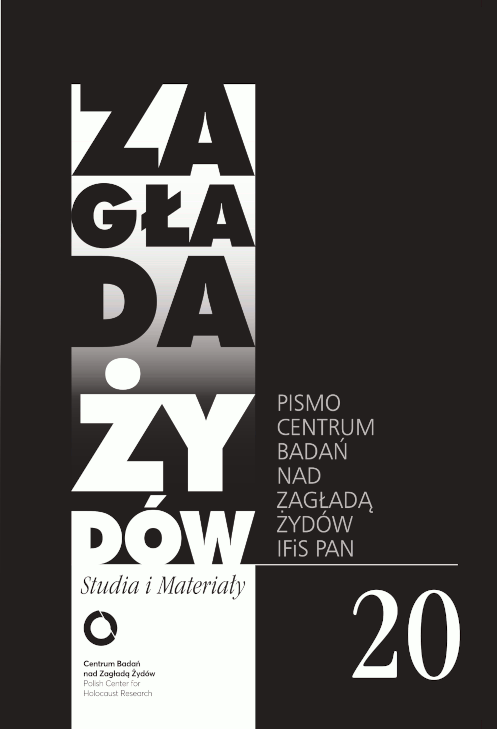The final touches are being put on the latest 20th anniversary issue of the annual 'Holocaust Studies and Materials", which will traditionally be published in the last days of the year. However, we already want to let you in on the secret by revealing the table of contents.
Studies

Monika Stolarczyk-Bilardie, “If the Holy See in 1942 knew about all these things, why didn’t it shout [it] to the world?” The Vatican in the face of the Holocaust: information from occupied Poland and its reception beyond the Bronze Gate, 1941–1943

Aleksandra Bańkowska, Between responsibility and powerlessness, generosity and temptation. Social care workers in the Warsaw ghetto in the face of their charges and petitioners

Justyna Kowalska-Leder, Three models of trust towards non-Jews on the Aryan side

Jan Olaszek, Jews and the Anders Army. The case of Roman Zimand
The Holocaust and psychology

Stanley S. Seidner, In the Shadow of History and Pathology: The Dilemma of David Wdowinski

Michał Bilewicz, Karolina Marcinkowska, The social psychology of the Holocaust: from naive situationism to understanding the role of ideology

France Grenaudier-Klijn, Anger as defiance, anger as self in Anna Langfus’ Le Sel et le soufre and Les Bagages de sable

Anne-Christin Klotz, Jasmin Spiegel, „This is not the time to dream?“ An explorative psychoanalytical and historical reading of selected dreams in diaries written by Jewish victims of the Holocaust in occupied Poland (1939–1945)

Victoria Van Orden Martinez, Emotions as testimony: Documenting the psychological aspects of witnessing in an early survivor historical commission

Katarzyna Prot-Klinger, Krzysztof Szwajca, , Psychotherapy for Holocaust survivors in Poland after thirty years
Materials

Rev. Józef Kruszyński, On German terror against Jews and Poles in 1942 [ed. Dariusz Libionka]

“Could there be any moral compensation for the obliteration of all traces of a thousand years of Jewish existence in Poland?” Unknown writings by Emanuel Ringelblum from 1943 [ed. Aleksandra Bańkowska, Maria Ferenc]

The diary of Pinkus Blumenfeld [ed. Barbara Engelking]

“Dangerous adventures and torments”. Relations of two women about how they survived the Holocaust on the territory of Bilgoraj county in the Lublin District [ed. Alina Skibińska]

“My life will begin on that day when I receive letters from you”. Correspondence of Jews who survived the Holocaust in the USSR and sought their relatives in Poland (1944–1945) [ed. Karolina Ożóg]
Points of view

Anna Wylegała, The unrecognized potential? Oral history in Polish Holocaust research

Andrzej Leder, Violence cannot be curbed

Marcin Kula, To the parade – or to psychotherapy? Michał Bilewicz, Traumaland. Polacy w cieniu przeszłości
From research workshops

Marcin Przegiętka, What did Adolf Gerteis, president of the Eastern Railway, know about the Holocaust?

Stefan Michał Marcinkiewicz, Sammellager Bogusze (November 2, 1942 – January 3, 1943) as an example of a transitional collective camp in the Operation “Reinhardt” in the Bialystok District

Jakub Chmielewski, Attitudes of Poles towards Jews in the light of occupation documents based on the example of the Lublin district in the years 1941–1944

Monika Polit, “This is what the Deputy Elder of the Jewish Community Jakubowicz could have said about it.” Legal proceedings against Aron “Arek” Jakubowicz

Agnieszka Kajczyk, Iwona Kurz, “Typical Image”: The album Extermination of Polish Jewry (1945)

Klara Jackl, “Is that me...” Henryk Beck’s pictorial memoir of the war and the Holocaust

Bożena Szaynok, The Church’s narrative of saving the Jews (1944–1987)
Commemorating the Holocaust

Zofia Wóycicka, In search of new ways to express what is difficult to comprehend. Holocaust museums and commemoration sites in the 21st century

Nawojka Cieślińska-Lobkowicz, The new Holocaust Museum in Amsterdam
Reviews

Natalia Judzińska, Lewa strona sali wykładowej. O instytucjonalizacji getta ławkowego w Uniwersytecie Stefana Batorego w Wilnie [Zofia Trębacz]

A family story from Izbica: Michał Rzeźnik, Piotr Rzeźnik – zdrajca z Izbicy [Anna Bikont]

Avinoam J. Patt, The Jewish Heroes of Warsaw: The Afterlife of the Revolt [Tom Navon]

Agnieszka Wierzcholska, Wspomnienia i kamienie. Życie i śmierć polsko-żydowskiego miasta Tarnów 1918–1956 [Karolina Panz]

Joanna Sliwa, Jewish Childhood in Kraków: A Microhistory of the Holocaust [Martyna Grądzka-Rejak]

“It is not a monograph, but rather a popular science study with the rigor of the workshop, the source base, the state of research”: Ryszard Kotarba, Żydzi Krakowa w dobie zagłady (ZAL/KL Plaszow) [Jacek Chrobaczyński]

Andrew Kornbluth, The August Trials: The Holocaust and Postwar Justice in Poland [Justyna Koszarska-Szulc]

Dieter Schenk, Witold Kulesza, Arthur Greiser. Biografia i proces namiestnika III Rzeszy w Kraju Warty [Andrzej Grzegorczyk]

Magdalena Hułas (red.), współpraca Piotr Długołęcki, Polskie Dokumenty Dyplomatyczne 1942 [Adam Puławski]

Yorai Linenberg, Jewish Soldiers in Nazi Captivity: American and British Prisoners of War during the Second World War [Agnieszka Haska]

Krzysztof Rybak, Obrazowanie Zagłady. Narracje holokaustowe w polskiej literaturze XXI wieku dla dzieci i młodzieży [Katarzyna Tałuć]

Jennifer V. Evans, Erica Fagen, Meghan Lundrigan, Holocaust Memory in the Digital Mediascape [Agnieszka Haska]

Robert Szuchta, Piotr Trojański, Holokaust. (Nie)odrobiona lekcja historii [Mirosław Skrzypczyk]

 English
English
 Język Polski
Język Polski


